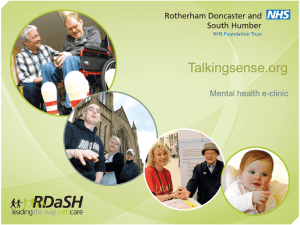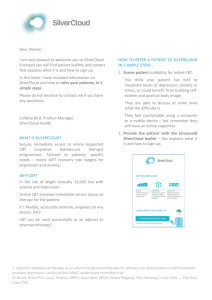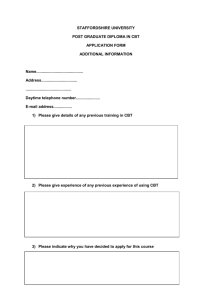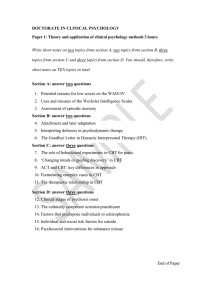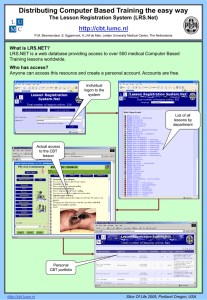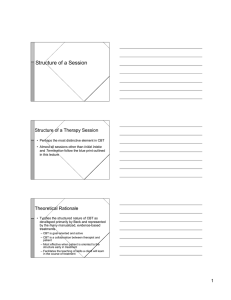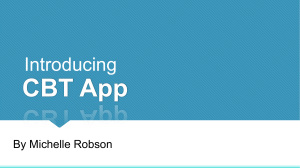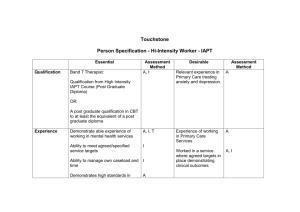Making the most of your book
advertisement
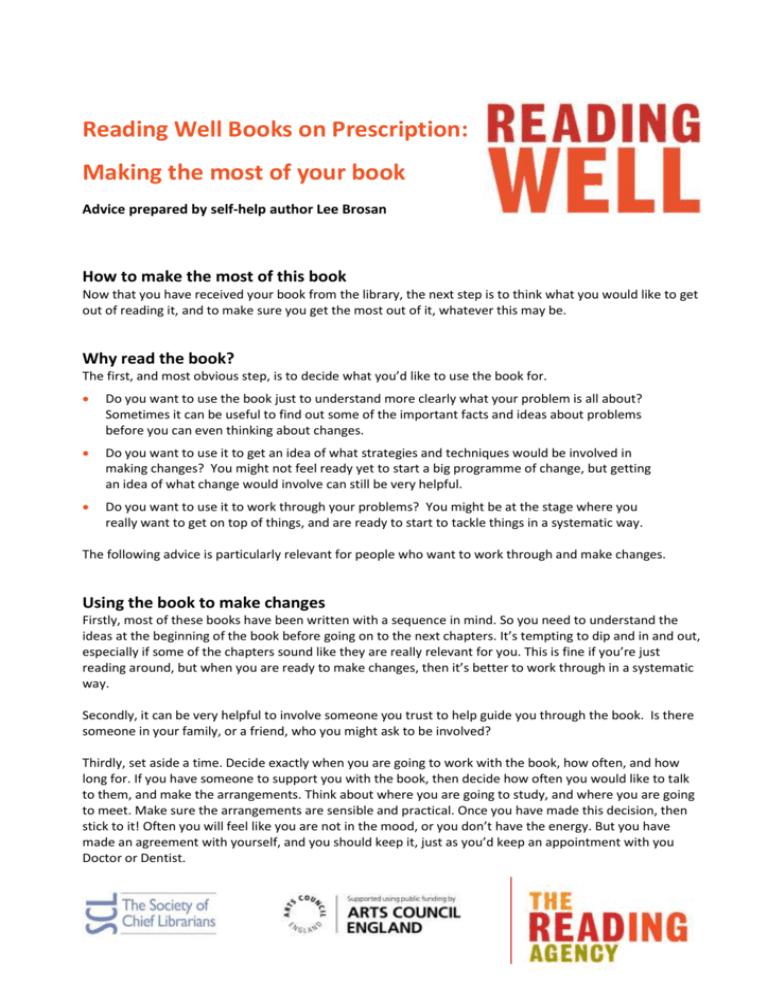
Reading Well Books on Prescription: Making the most of your book Advice prepared by self-help author Lee Brosan How to make the most of this book Now that you have received your book from the library, the next step is to think what you would like to get out of reading it, and to make sure you get the most out of it, whatever this may be. Why read the book? The first, and most obvious step, is to decide what you’d like to use the book for. Do you want to use the book just to understand more clearly what your problem is all about? Sometimes it can be useful to find out some of the important facts and ideas about problems before you can even thinking about changes. Do you want to use it to get an idea of what strategies and techniques would be involved in making changes? You might not feel ready yet to start a big programme of change, but getting an idea of what change would involve can still be very helpful. Do you want to use it to work through your problems? You might be at the stage where you really want to get on top of things, and are ready to start to tackle things in a systematic way. The following advice is particularly relevant for people who want to work through and make changes. Using the book to make changes Firstly, most of these books have been written with a sequence in mind. So you need to understand the ideas at the beginning of the book before going on to the next chapters. It’s tempting to dip and in and out, especially if some of the chapters sound like they are really relevant for you. This is fine if you’re just reading around, but when you are ready to make changes, then it’s better to work through in a systematic way. Secondly, it can be very helpful to involve someone you trust to help guide you through the book. Is there someone in your family, or a friend, who you might ask to be involved? Thirdly, set aside a time. Decide exactly when you are going to work with the book, how often, and how long for. If you have someone to support you with the book, then decide how often you would like to talk to them, and make the arrangements. Think about where you are going to study, and where you are going to meet. Make sure the arrangements are sensible and practical. Once you have made this decision, then stick to it! Often you will feel like you are not in the mood, or you don’t have the energy. But you have made an agreement with yourself, and you should keep it, just as you’d keep an appointment with you Doctor or Dentist. Fourthly, get into the habit of writing things down. Obvious though it may sound, making notes of ideas and plans makes a big difference to how likely you are to remember them and to carry them out. So get a notebook, and keep it somewhere where you know you can find it easily. Or make a file or folder on your computer or tablet dedicated to your work with the book. Last but not least, and tedious though it is, remember that making changes requires perseverance. It’s a bit like starting to exercise. Most people wouldn’t expect to see great changes after a single gym session. It wouldn’t make a lot of sense after one workout to say, “Well exercise doesn’t make any difference does it”. Making changes to how you feel is the same – at first all you may notice is the pain and effort, but over time you will start to notice much greater changes. Why this book? Your GP has suggested this book because it is the most suitable one for your particular problem. All of the books in the Reading Well Books on Prescription scheme have been written by psychologists, psychiatrists, and others who are experts in their field. They will have spent a long time helping people with problems like yours, and will often be the people who have developed new aspects of treatment. They have written their books in order to make the treatment approach as widely available as possible. The treatments which the books are based on come under the general term ‘cognitive behaviour therapy’, or CBT. All the books will explain what this is very early on. CBT has been shown to be a very effective treatment for you problem. The books have all been recommended by experts and endorsed by well-known mental health organisations. They have been tried and tested and found to be useful. What else can I do? If you’ve made a good attempt to use the book and not much has changed, or if you’ve read it and feel that making the changes suggested would just be too much for you, then don’t despair. Self-help reading is not for everyone, and many people need different kinds of help. The information below gives some suggestions of places you can go to find other kinds of help. What is more, the book you have been given will also contain a ‘Resource’ or ‘Further Help’ section at the end which will give more details of how to get help for your specific problem. Other sources of help Your GP can help you to talk over alternatives to self-help books. These might include taking medication, or referral to a CBT therapist. The British Association of Behavioural and Cognitive Psychotherapists (BABCP) can help you to find a CBT therapist. (www.babcp.org) The NHS Choices and NHS Direct websites give a lot of information about different conditions and what help is available. (www.nhs.uk and www.nhsdirect.nhs.uk) If you are feeling desperate, then the Samaritans organisation will provide you with emotional support. They can be emailed at jo@samaritans.org, or phoned on 08457 90 90 90 (UK) or 1850 60 90 (Republic of Ireland) A final word from the Library We hope that this book will help you, but please help us by not writing in it! It can be very tempting when you find an idea that you want to highlight, or a worksheet that you want to fill in. It’s ok to photocopy a few pages for your own use, and if you don’t have access to a photocopier then the library staff will be able to help.
